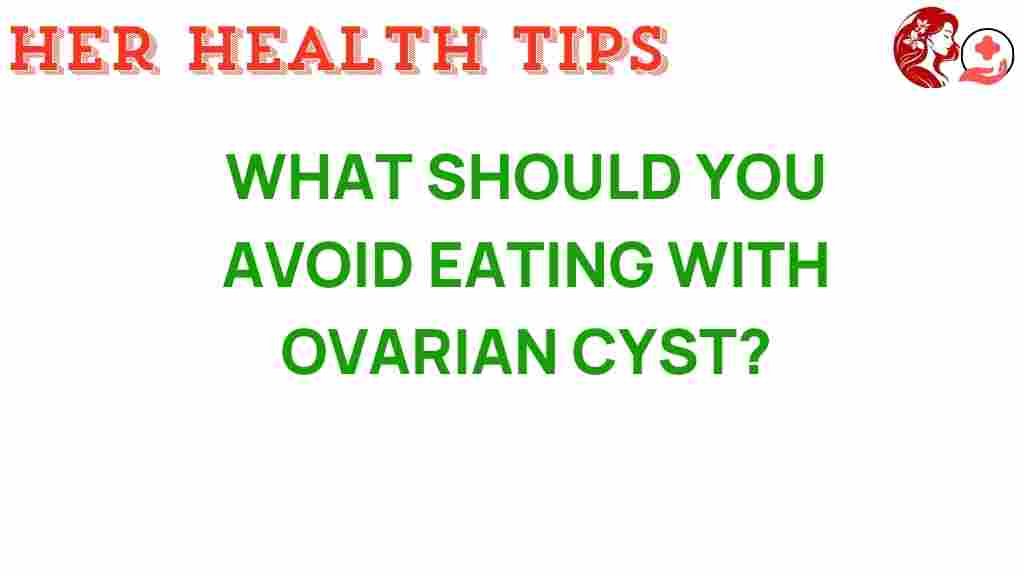The Hidden Dangers: Foods to Avoid with Ovarian Cysts
Ovarian cysts are fluid-filled sacs that develop on the ovaries and are relatively common in women of reproductive age. While many cysts are harmless and resolve on their own, others can cause discomfort and health issues. Managing ovarian cysts often involves dietary changes and understanding which foods to avoid to promote overall wellness and reduce inflammation. This article will explore the connection between ovarian cysts and diet, highlighting specific food restrictions that can help manage symptoms and improve your health.
Understanding Ovarian Cysts
Before diving into dietary recommendations, it’s essential to understand what ovarian cysts are and their symptoms. Ovarian cysts can be classified into several types, including functional cysts, dermoid cysts, and endometriomas. Symptoms may vary, but common signs include:
- Pelvic pain
- Irregular menstrual cycles
- Abdominal bloating
- Difficulty emptying the bladder
- Changes in weight
While many women experience no symptoms, those with larger cysts or complications may find these issues disruptive. Effective management is crucial, and nutrition plays a vital role in this process.
The Role of Diet in Managing Ovarian Cysts
Diet can significantly influence the body’s inflammatory responses and hormonal balance. Certain foods can exacerbate symptoms and inflammation, making it essential to identify and avoid them. Below are key food restrictions to consider:
1. Processed Foods
Processed foods often contain unhealthy fats, sugars, and additives that can contribute to inflammation. Common processed foods to avoid include:
- Fast food
- Packaged snacks (chips, cookies)
- Processed meats (hot dogs, deli meats)
- Frozen meals
Instead, focus on whole foods that are rich in nutrients, such as fruits, vegetables, whole grains, and lean proteins.
2. Sugary Foods and Beverages
High sugar intake can lead to insulin resistance, which is linked to hormonal imbalances and can worsen ovarian cyst symptoms. Foods and drinks to limit include:
- Soda and sugary drinks
- Candy and sweets
- Baked goods made with refined sugar
Opt for natural sweeteners like honey or maple syrup in moderation, and prioritize whole fruits for sweetness.
3. Dairy Products
Some studies suggest that dairy may increase estrogen levels, potentially aggravating ovarian cysts. Consider reducing or eliminating:
- Milk
- Cheese
- Ice cream
For those who enjoy dairy, alternatives like almond or coconut milk can be a great substitute.
4. Red Meat and Processed Meats
A diet high in red meat and processed meats has been linked to increased inflammation. Try to limit consumption of:
- Beef
- Pork
- Bacon
Instead, consider incorporating lean protein sources, such as chicken, turkey, fish, and plant-based proteins like beans and lentils.
5. Refined Carbohydrates
Refined carbohydrates can spike blood sugar levels, leading to insulin resistance. Foods to avoid include:
- White bread
- Pasta made from white flour
- White rice
Whole grains are a better choice, providing essential nutrients and fiber to help maintain stable blood sugar levels.
6. Caffeine
Caffeine can disrupt hormonal balance and exacerbate cyst-related symptoms. It may be wise to limit or eliminate:
- Coffee
- Energy drinks
- Excessive tea consumption
Consider herbal teas or decaffeinated options as alternatives to reduce caffeine intake.
7. High-Sodium Foods
A diet high in sodium can lead to fluid retention, which may worsen discomfort associated with ovarian cysts. Avoid foods such as:
- Salty snacks
- Canned soups
- Processed sauces (soy sauce, barbecue sauce)
Instead, use herbs and spices to flavor your meals without added salt.
Foods to Include for Wellness
While it’s crucial to know what foods to avoid, it’s equally important to know what to include in your diet. Focus on:
- Fruits and Vegetables: Rich in antioxidants and anti-inflammatory compounds.
- Whole Grains: Such as quinoa, brown rice, and oats, which help maintain stable blood sugar levels.
- Healthy Fats: Including avocados, nuts, seeds, and olive oil, which can help reduce inflammation.
- Lean Proteins: Such as fish, chicken, and legumes that support hormonal balance.
- Herbs and Spices: Turmeric and ginger are known for their anti-inflammatory properties.
Step-by-Step Process for Dietary Management
Managing ovarian cysts through diet requires a systematic approach. Here is a step-by-step process to follow:
- Consult with a Healthcare Professional: Before making significant dietary changes, consult with a doctor or a registered dietitian.
- Keep a Food Diary: Track what you eat and any symptoms experienced to identify triggers.
- Eliminate Problematic Foods: Gradually remove processed foods, sugar, dairy, and red meat from your diet.
- Incorporate Healing Foods: Focus on whole foods that promote wellness, such as fresh fruits, vegetables, and lean proteins.
- Monitor Symptoms: Pay attention to how your body responds to dietary changes and adjust accordingly.
- Stay Hydrated: Drink plenty of water to support overall health and reduce inflammation.
Troubleshooting Tips for Dietary Changes
Making dietary changes can be challenging. Here are some troubleshooting tips to help you stay on track:
- Meal Prep: Prepare meals in advance to avoid reaching for unhealthy options when you’re busy.
- Read Labels: Always check the nutritional information and ingredients in packaged foods.
- Find Alternatives: Experiment with healthier substitutes for your favorite foods.
- Stay Educated: Keep learning about nutrition and its impact on ovarian cysts to stay motivated.
For more comprehensive insights into managing ovarian cysts and nutrition, consider visiting this resource.
Conclusion
Understanding the connection between ovarian cysts and diet is crucial for effective management and overall wellness. By avoiding certain foods that contribute to inflammation and hormonal imbalance, you can help alleviate symptoms and promote better health. Focus on incorporating nutrient-dense foods, staying hydrated, and consulting with healthcare professionals for personalized advice.
Remember, each individual’s body is unique, so what works for one person may not work for another. Listen to your body, make gradual changes, and monitor your progress. With the right diet and lifestyle adjustments, you can take significant steps towards managing ovarian cysts effectively.
This article is in the category Reproductive and created by HerHealthTips Team
